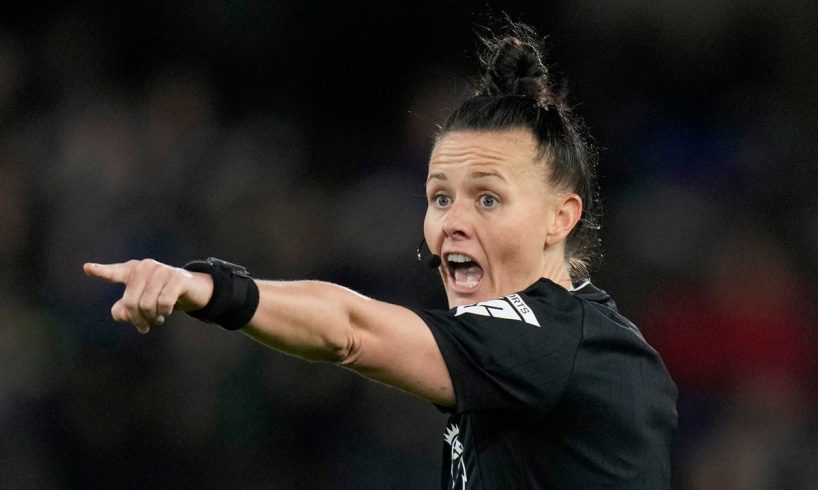
Rebecca Welch made history when she became the first female referee of a men’s Premier League match (Copyright 2023 The Associated Press. All rights reserved)
Men’s football has traditionally been reserved for men, on the terraces, on the field, behind the scenes, and officiating the matches. Over the years women have proven that they have a rightful place in the men’s game, first in the stands, then in the press box, and much more recently as referees.
In December 2023, Rebecca Welch became the first woman to officiate a Premier League match. The setting was Fulham’s 2-0 home defeat by Burnley, but the impact would be felt far from the shores of the Thames.
The first female football reporter went on the airwaves in 1969, and the first woman among the Fleet Street press was in 1973, but there was not a woman commentator on the flagship BBC programme Match of the Day before 2007. When it came to officials, it was not until 2010 that Sian Massey-Ellis became the first female assistant referee, and Welch took another 13 years to become the first to take charge on the field.
On the playing side, it was only in 2009 that the Football Association introduced central contracts, and there was not a professional football league until 2018. Of course, it is worth mentioning that the growth of women’s football was stunted by the 1921 FA ban, barring women from playing organised football and using professional pitches and facilities. This ban remained in place until 1971, and the sport is only just reaching the heights of packed-out stadiums that it had almost 100 years previously.
But in recent years, female officials have been on the rise, but as Natalie Aspinall tells The Independent, the journey from grassroots to running the lines in the Premier League, is far from straightforward.
Sian Massey-Ellis was the first female assistant referee in the English top flight (Getty Images)
Aspinall’s journey started as a 14-year-old in search of a part-time job, and was encouraged to take up refereeing by her father, who believed she would not commit to a 6 am paper round.
Speaking from her home, Aspinall looked back at her rise to the top: “When I started perhaps people didn’t want me to referee. There wasn’t much acceptance.
“People would try to put barriers in the way. They’d say ‘You can’t referee junior football there’s no changing rooms’ so me and my dad would go changed, or ‘There would be no toilets for her’, well that’s okay, I’ll go the toilet before I leave for the game.
“Me and my dad had to find ways to overcome these barriers and then the more and more I got into it, the more and more I enjoyed it.
“Then, the only way I can explain it, is it just becomes something that you do. It becomes normal to go out and referee, so it’s just something that I’ve continued doing. Now I’m in a position that I never ever thought was possible or that I would never achieve.”
Natalie Aspinall has been assistant referee at the top flight since the 2022-23 season (Getty Images)
Hopefully, Welch’s continued time in the middle will lead to an increased number of women referees and officials at the top level. After all, it is already happening at a grassroots level. Between October 2021 and October 2023, there was a 78 per cent increase in the number of female referees across all levels and an 83 per cent increase in the number of active female coaches with qualifications at level one and above.
For Aspinall, the rise of women’s football has formed part of the journey and it is something she looks back on fondly.
I’m really proud to have been part of this journey within women’s football. I think sometimes as referees I think people forget that we’ve been part of this journey with the women’s game too.
“Because I can remember refereeing when the Super League was the Women’s Premier League, and Everton played at Marine, and these were the grounds they were playing on week in and week out, and we’ve been part of that journey, domestically and internationally.
“To see the impact that that has on my children and their friends now, it’s something that I’m really proud of.”
Joanna Stimpson, The FA’s National Women’s Refereeing Manager said: “As we celebrate International Women’s Day, it provides us with the chance to reflect on the power of football to open up opportunities to a new generation of women and girls involved in the game through officiating.
“With numbers joining the women’s refereeing pathway growing year on year, and inspirational female role models such as Rebecca Welch, Lauren Impey and Emily Heaslip operating at the very top of the professional game, there’s never been a more exciting time to be involved.”
Aspinall’s first Premier League match as at Molineux (Getty Images)
Forest Green broke new ground in July 2023, when Hannah Dingley, who had already become the first female academy manager in men’s football with Forest Green in 2019, took charge as caretaker manager of the men’s first team.
“I am the first and it’s great but I don’t want to be the first and the only,” Dingley said at the time, and it is a sentiment shared by almost all women who break down barriers. Dingley herself did not take permanent charge but instead returned to her role as head of the club’s academy.
Massey-Ellis, who became an assistant referee in the Premier League, and also managed to return to the top after having a baby, echoed the sentiment, saying: “We are good enough to be there and if we’re there, we’re not there as a tick-box.”
Hannah Dingley became the first female manager when she took over as an interim head coach at Forest Green (Getty Images)
It is after all not so many years ago that Sky Sports’ celebrated partnership of Andy Gray and Richard Keys felt comfortable making sexist comments about women in the industry, under the assumption that they were off air. Their remarks included the antiquated notion that women officials “don’t know the offside rule” directed at Massey-Ellis, and another clip of Gray referring to her looks.
Women’s football has risen exponentially in recent years, from the success of the Lionesses in Euro 2021 and reaching the final of the World Cup in 2023, to Mary Earps becoming the first female footballer to win Sports Personality of the Year.
However, that rise does not necessarily translate to women breaking down barriers in men’s football. The rise of women’s football has developed new opportunities for many in the game, including more opportunities for female managers and officials, yet that has not been translated to the same extent in the men’s game.
There remains one key barrier left to be broken. A permanent female manager of a men’s team. But it is not something that can be rushed and would have to come out organically. Many women would rightly not want the added media attention that would come with it, and in order to succeed it would have to be an appointment based on merit, rather than for positive PR or increased media attention.





